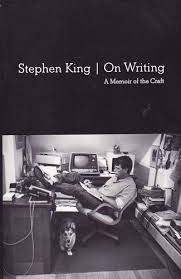When a book, particularly On Writing: A Memoir of the Craft by Stephen King, has been touted at “the best craft” book for writers, it’s really hard to approach it in a neutral frame of mind. Especially when you are not a big reader of his work, that kind of touting can result in disappointment of an equal scale. I have to say, it wasn’t what I was expecting, but what I should have been.
I opened the book expecting a break-down of what writers need to succeed, based on Stephen’s own experience. But what this book is entailed in the title: a memoir. The first third of the book is the story of how the inexperienced young man became a writer. It pulls no punches: there was lots of rejection, a good dose of struggling by with menial employment, and a whole lot of hard work. Some people are horrible narrators of their own experience, and make it out to be a glorious quest. But Stephen writes with his characteristic gritty realism, simplified language and trims out the unnecessary.
The second section of Stephen’s craft book is a brief run-down of what it takes to be a good writer. He makes sure to clarify that he does believe there are people who cannot be writers, people who can be crafted into good writers, and great writers. He doesn’t give himself any airs: he is well aware that he is not considered to be a master wordsmith, but he says he must be reasonable, given how others enjoy his work.
Some of his tips are standard (though whether they are standard because of his book or whether they predate it, I do not know, given the original book was published in 2001): write a lot, read as much, have your own space for writing, write your own truths (versus write what you know), to write good dialogue writers must listen, give your drafts a rest before you edit and most importantly, don’t do it for the money.
He does discuss some aspects that aren’t as often discussed. He’s not a fan of plotting, more of allowing the story to be unearthed naturally. Keep your enthusiasm for the story by keeping working on it, by keeping it to yourself for at least the first draft. The extra touches, he advises, can be built into the later drafts. Backstory should be simple and elegantly woven in; research it if you must, but work to make it seamless and the story authentic.
My only criticism of his advice was he chose to talk about agents, which I got the impression that he himself had very little experience with. He did talk mostly of friends who had acquired agents after some time, after some successes, and by picking those who already represented similar works. The trouble is to my mind is that he has not had the personal experience of one; his own trajectory was a very different one. It is also not quite as relevant given the plethora of ways a writer can achieve success in the current market; so this section of the book was a little outdated for me.
The finishing section is unique to the 2010 edition, I believe, talking about Stephen’s return to writing after he was hit by a van and hospitalised with severe trauma. It is a real testament to his commitment to his craft, and his description of his first session writing after the accident was an intense reminder that dedication is a huge part of this career. His descriptions of his injuries and his conduct during his (probable) delirium actually elicit a few smiles, even through the internal horror realising what he must have been going through.
All in all, I enjoyed the style of Stephen King’s On Writing; more memoir than serious craft novel, but all the more engaging for the personal touch. It is also understandable that many could relate to it: Stephen is humble about his own gift and his achievements, which is unusual for a writer of his level of success.
I do recommend it to other writers, particularly those who haven’t read a lot of other craft books, as it is innately readable and offers clear, constructive advice. Those who enjoy his other work will undoubtedly enjoy getting to know the man all the more.

Black Beacon Books liked this on Facebook.
Gerry Huntman liked this on Facebook.
Sarah Ciacia liked this on Facebook.